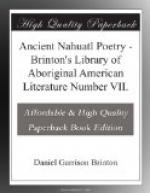16. tlapalcayocan, “the place of shards,” of broken pieces, i.e., the field of battle.
19. The word totomihuacan, which has already occurred in vv. 3 and 7, I have translated as referring to the war captains of the Mexican armies, called otomi (see Bandelier, On the Art of War of the Ancient Mexicans, p. 117). I am quite open for correction however.
27. in ipetl icpal; in a translation of an ancient song, Ixtlilxochitl renders the expression in ipetl icpal in teotl, “en el trono y tribunal de Dios,” Historia Chichimeca, cap. 32.
29. Mictlan; the place of departed souls in Aztec mythology.
NOTES FOR SONG XVI.
In this stirring war-song, the poet reproaches his friends for their lukewarmness in the love of battle. He reminds them that life is transitory, and the dead rise not again, and that the greatest joy of the brave is on the ringing field of fray where warriors win renown. It is in the spirit of the Scotch harper:—
“’Twere worth ten years of peaceful life,
One hour of such a day.”
1. Each verse terminates with an interjectional refrain. The frequent introduction of the particle on is intended to add strength and gravity to the oration.
2. oppan piltihua. Compare this expression with that in v. 22, p. 44.
3. xochimicohuayan, should perhaps be translated, “where the captives to be immolated to the Gods are taken.” The xochimique, “those destined to a flowery death” were the captives who were reserved for sacrifice to the gods. See Joan Bautista, Sermonario en Lengua Mexicana, p. 180.
4. yaoxochimiquiztica, “pertaining to the slaughter of the flowery war.” This adjective refers to the peculiar institution of the “flowery war,” guerra florida, which obtained among the ancient Mexicans. It appears to have been a contest without provocation, and merely for the display of prowess and to take captives to supply the demand for human sacrifices in the religious rites. On this see Tezozomoc, Cronica Mexicana, cap. 96.
NOTES FOR SONG XVII.
In this long fragment—the closing strophes are missing in my MS.—the bard represents himself as a stranger appearing before the nobles of Huexotzinco at some festival. The first two verses appear to be addressed to him by the nobles. They ask him to bring forth his drum and sing. He begins with a laudation of the power of music, proceeds to praise the noble company present, and touches those regretful chords, so common in the Nahuatl poetry, which hint at the ephemeral nature of all joy and the certainty of death and oblivion. An appeal is made to the Master of Life who inspires the soul of the poet, and whose praises should be ever in mind.




